Lenovo IdeaPad 3 (14-inch) Review
Lenovo IdeaPad 3 (14-inch) Review
An incredibly cheap laptop with one significant flaw
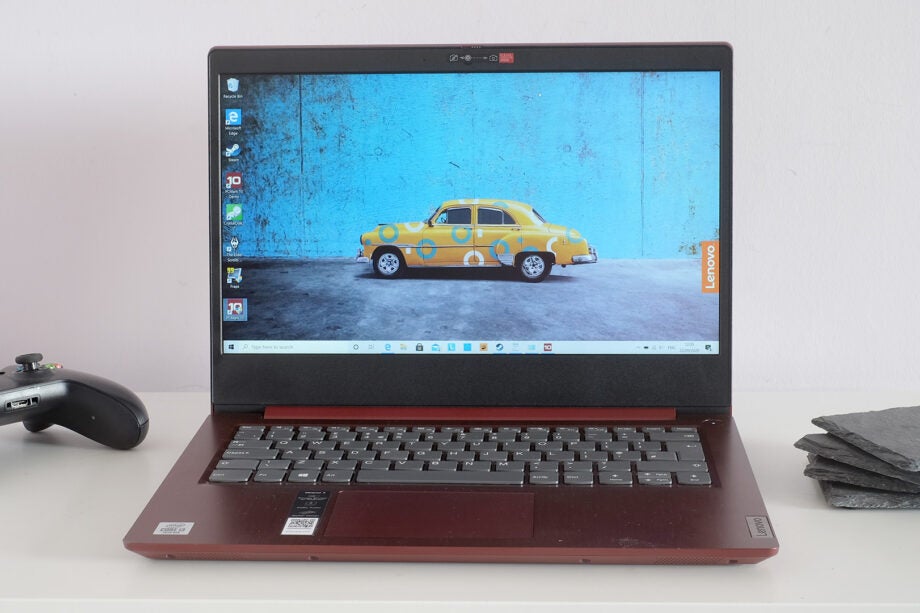
Verdict
The Lenovo IdeaPad 3 (14-inch) has a keyboard made for work and enough power for some fun, but the IdeaPad 3 is let down by a poor screen and relatively short battery life
Pros
- Good performance for the price
- Deep keyboard
- Tries to avoid the typical style-free zone of cheap laptops
Cons
- Low-quality screen
- No USB-C
- Lacks "all day" battery life
Key Specifications
- Review Price: £429.99
- 14in 1920 x 1080 TN LCD screen
- Intel Core i3-1005G1
- 4GB RAM
- 128GB SSD
- Dimensions: 327 x 241 x 19.9 mm
- Weight: From 1.6 kg
The Lenovo IdeaPad 3 (14-inch) is a low-cost laptop that might be a good fit for students, or families who don’t need earth-shattering power.
It runs Windows 10 S, which means you’re restricted to Windows Store apps unless you switch it to full Windows 10. You can do this for free in a matter of seconds, although will see some performance compromises.
The Lenovo IdeaPad 3 has an Intel Core-series processor, one more powerful than the typical Windows 10 S laptop. So why is Windows 10 S even here? The laptop has limited RAM and storage, and the restricted software is a heads-up of who it’s meant for.
It performs the basics just fine, thanks to an unusually deep and responsive keyboard and near-silent running. However, the screen is poor and its battery doesn’t get quite close enough to all-day use. But is it still a good value laptop?
Related: Best Laptop 2020
Lenovo IdeaPad 3 Design – Imposter aluminium
The Lenovo IdeaPad 3 is out to play tricks on us. Its keyboard plate and lid have a fairly convincing brushed metal effect to their finish, yet both parts are plastic with a slight metallic sheen.
This plastic is also very smooth, which feels tackier on your palms than either anodised aluminium or textured plastic. However, well done Lenovo, you had us for a minute. The Lenovo IdeaPad 3’s underside is the typical rough textured plastic of an affordable laptop.
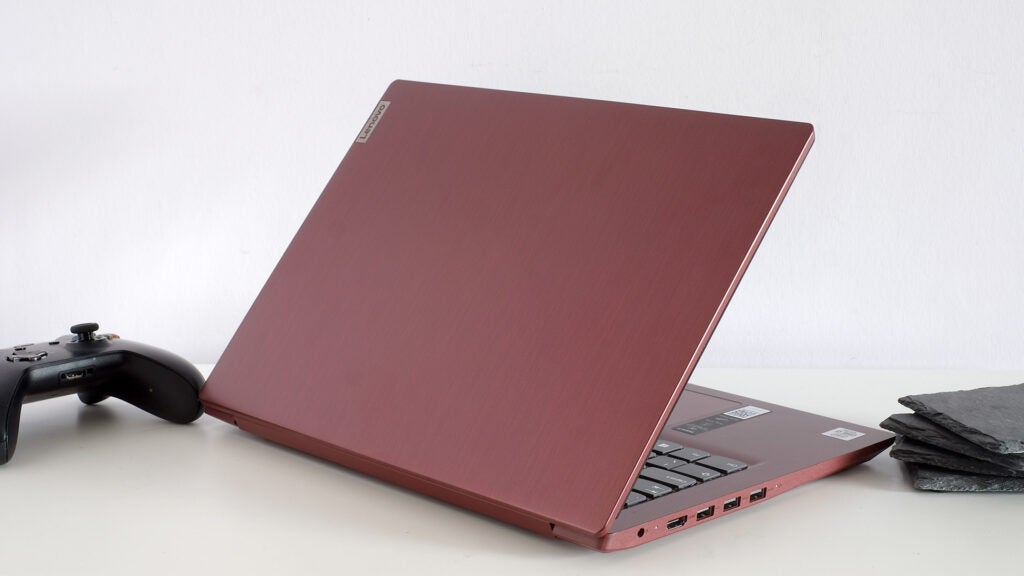
Build quality is fair, if no better than the norm. The keyboard surround will flex a little under the pressure of hard typing, if not enough to ruin the experience, and the inside of the IdeaPad 3 looks a little too much of a mish-mash.
You have the metal-effect plastic base, mid-grey keyboard keys, a textured plastic hinge and a cheap-looking screen. Lenovo has made some great-looking mid-price laptops over the years, but this cheaper one won’t convince too many eyes – it’s anything but a budget model close-up. That metal effect illusion works best from a distance.
Still, the screen part is fairly stiff and it’s light enough to treat as a portable laptop. The Lenovo IdeaPad 3 weighs 1.6kg and is 20mm thick. It’s far from being truly thin and light, but we are talking about a £430 laptop.
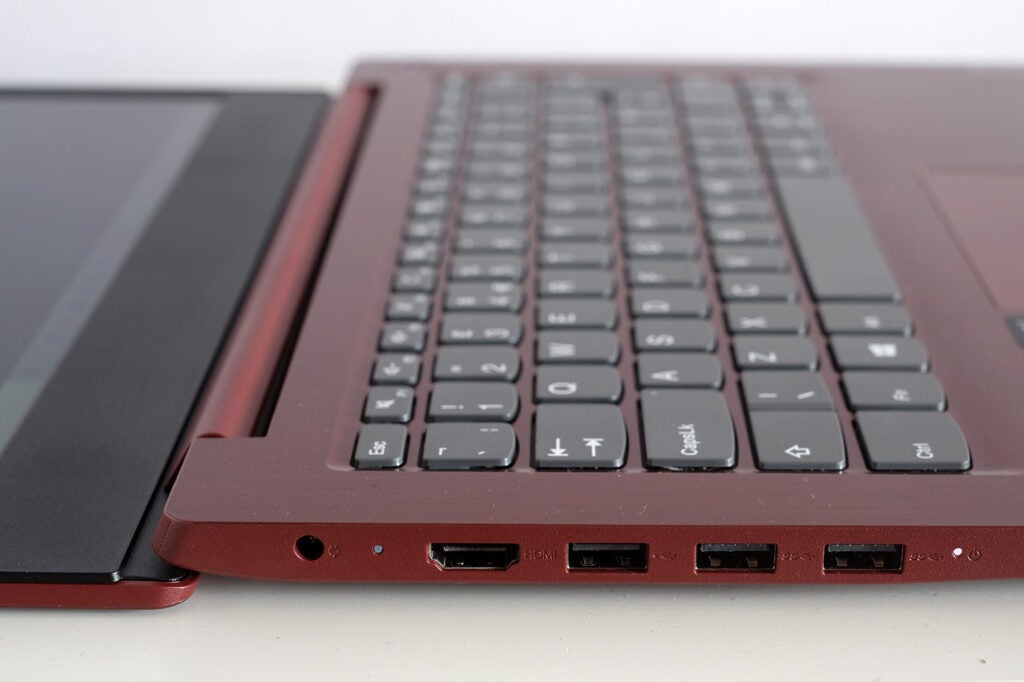
Consider plugging in a mouse for home use, but all you right-handers will have to do so on the “wrong” side of the laptop because the Lenovo IdeaPad 3’s USB ports are all on the left. There is the usual trio: one USB 2.0 and two USB 3.0s, but I’d expect to see the slower one on the right hand-side of the Lenovo IdeaPad 3.
You don’t get a USB-C port either, which seems a head-scratcher in 2020.
The retro connection line-up is completed by a full-size SD card slot and a full-size HDMI. In all honesty, the Lenovo IdeaPad 3 has everything I use day-to-day, but the lack of a USB-C is surprising.
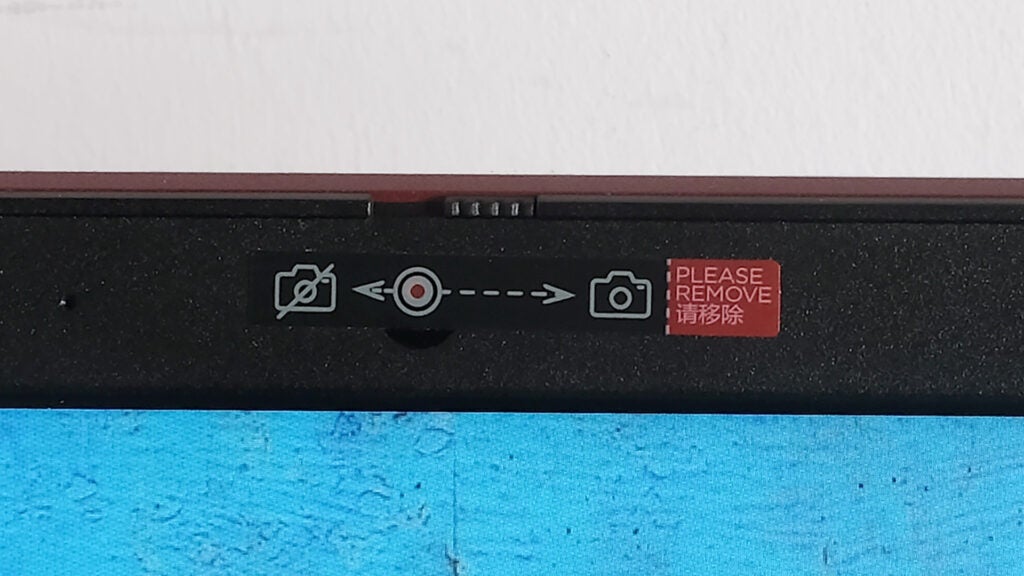
There are just a few other points to mention. The Lenovo IdeaPad 3’s speakers are, you may gave guessed, pretty poor. They have the thin, bass-free sound typical of your average budget laptop.
The webcam is dreadful too, and uses a low quality VGA sensor. Lenovo has added a little privacy slider to the cam for those worried about security. It physically blocks the sensor, so you can be sure no apps are spying on you.
Related: Best Budget Laptop 2020
Lenovo IdeaPad 3 Keyboard – Deep-dish plastic
The Lenovo IdeaPad 3 keyboard also suggest this laptop is meant more for work than play. While there’s a certain hollow sound to key presses ringing through the plastic shell, if you type hard, this is actually a lovely keyboard for long-form typing.
Key action is unusually high, resulting in a much deeper feel than almost every top-price laptop. Each depress comes with a chunky clonk rather than a thin click. It’s a joy to type on, particularly considering the Lenovo IdeaPad 3’s price.
You don’t, however, get any glossy extras. The Lenovo IdeaPad 3 does not have a keyboard backlight and there’s no fingerprint sensor for quick logins.
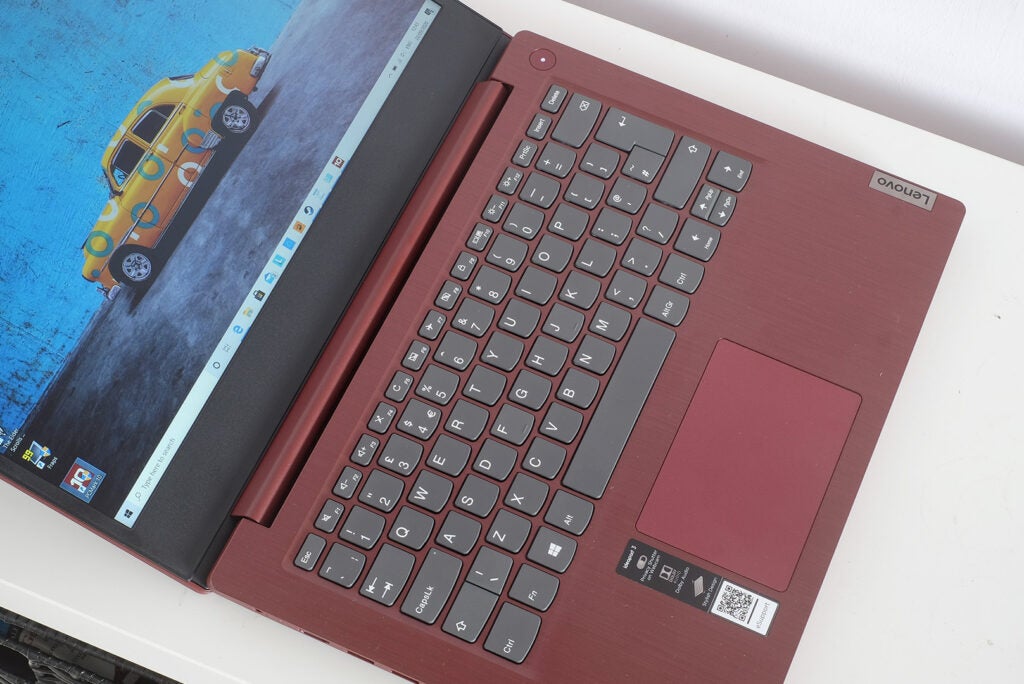
Its trackpad is not as impressive as the keyboard. It’s a rounded off rectangle of plastic and there’s a little wobble to its clicker. While the keyboard can be rather quiet if you attack it with light fingers, the touchpad has a fairly loud and thin clicker sound.
If Lenovo got rid of the IdeaPad 3’s pre-click wobble I’d be happy – you can’t expect a glass touchpad at £400.
Lenovo IdeaPad 3 Display – Pale and wan
The Lenovo IdeaPad 3’s fake metal plates aren’t really a reason to be put off this laptop but its screen might be.
On paper it sounds great: a 14-inch Full HD display with an anti-glare coating to make working outdoors viable. It’s not a touchscreen but the hinge lets it fold back by 180 degrees. However, it’s a TN (twisted nematic) panel.
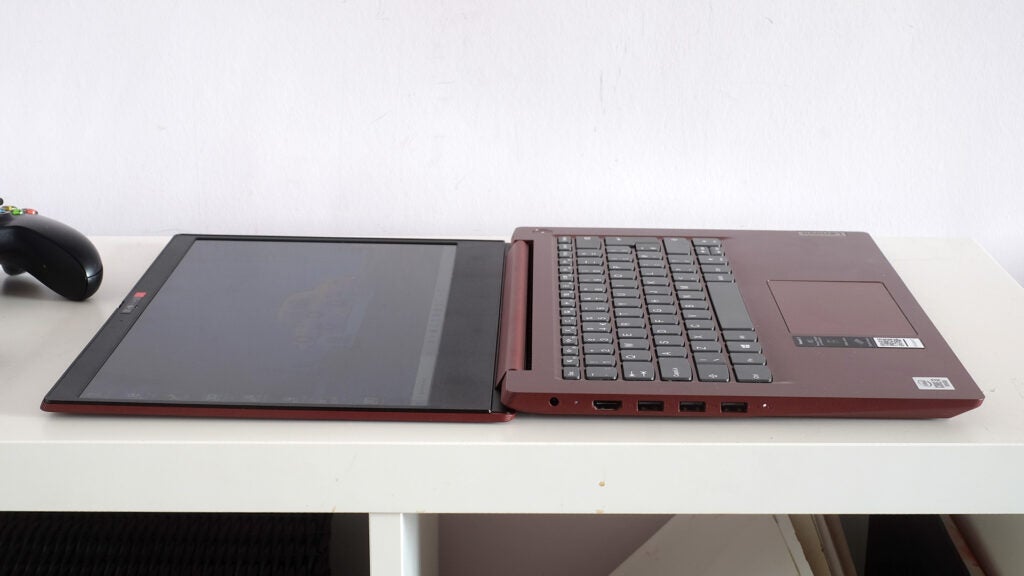
TN screens almost always offer dramatically worse image quality than an IPS LCD, the type used by almost all pricier laptops and the majority of phones and tables. The Lenovo IdeaPad 3’s colour saturation is very weak, contrast is low and the effects of the panel’s contrast shift are obvious.
Want the numbers? My SpyderX Pro says it covers just 55.4% of sRGB, 38.2% of Adobe RGB and 39.3% of DCI P3, which means it offers dreadfully poor colour accuracy. Maximum brightness is also way below the average at 223 nits, resulting in a poor 706:1 contrast.
Tilt the screen back and its character changes too, making what’s on screen far less clear. There’s no dressing this one up: it’s a bad screen. Here’s the effect of TN contrast shift in action:
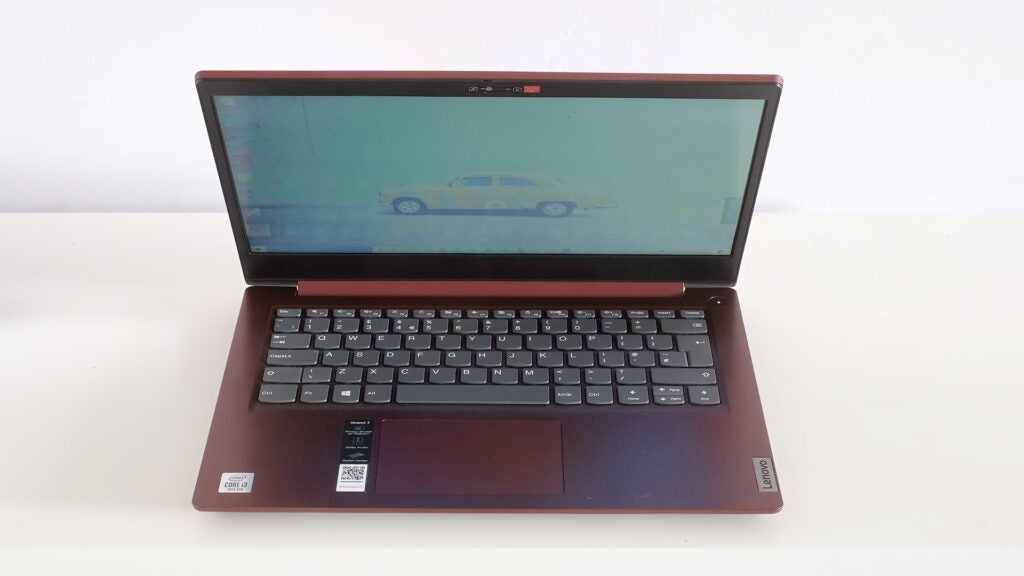
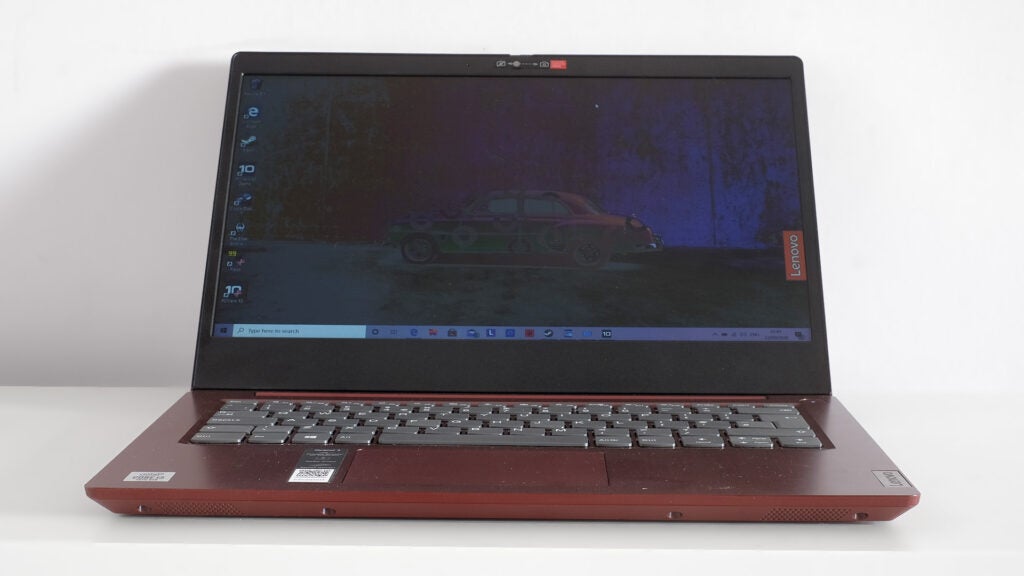
The Lenovo IdeaPad 3 is not a great laptop for movie-watching or basic gaming. While this laptop can technically play Skyrim – more on that later – the limited colour reproduction does not remotely show that fantasy world at its best.
The Lenovo IdeaPad 3’s matte finish means it can actually be used outdoors on a sunny day reasonably comfortably. Watching a cached Netflix movie won’t be much fun, but text editing look OK, thanks to the very high contrast involved. Yes, it’ll look dim, but you can make the text out.
The screen is comfortably the worst part of the Lenovo IdeaPad 3. I don’t expect a particularly high-quality screen at the price, but twisted nematic panels are hard to stomach in 2020. An IPS display, even a bad one, would make this a much better laptop for video and gaming.
Related: Best Monitor 2020
Lenovo IdeaPad 3 Performance – Perfect for the basics
The Lenovo IdeaPad 3 has an Intel Core i3-1005G1 processor, 4GB RAM and a 128GB SSD drive.
This line-up had me wondering why the IdeaPad 3 comes with Windows 10 S instead of full Windows. A Core i3-1005G1 is much more powerful than the kind of Intel Pentium Gold processor that usually gets the cut-down OS. As ever, there’s nothing wrong with a Core i3.
| Lenovo IdeaPad 3 | Surface Go 2 | Honor MagicBook 14 | |
| Geekbench 5 single-core | 1080 | 427 | 792 |
| Geekbench 5 multi-core | 2078 | 970 | 3035 |
| PCMark 10 | 3004 | 1888 | 3301 |
But does the limited 4GB RAM hold you back?
For the basic stuff it does not. Doing my usual day-to-day work the Lenovo IdeaPad 3 is clearly much faster and smoother than the base-spec Microsoft Surface Go 2, which has an Intel Pentium CPU. It’s about as nippy as any £1000 laptop for undemanding jobs. The SSD probably helps. Its 1780MB/s read and 839MB/s write speeds are respectable.
How about Photoshop? It will run OK for the basics, but 4GB RAM is not enough if you want to start working on big layered images. Photoshop is a RAM hog, and when it runs out you will start to see significant slow-down and potentially some crashes.
Spend a bit more and you can get an 8GB laptop with a Core i5 CPU, which is the norm for £1000+ laptops. Still, at around £400 the Lenovo IdeaPad 3 is one of the more powerful options around. It can do more than the majority of Chromebooks.
You don’t get a graphics card, just the integrated graphics that is part of the Core i3 processor. There was little point in subjecting the Lenovo IdeaPad 3 to our usual gaming tests, but I did try out Skyrim to see if it would run.
You’ll be stuck at “low” graphics, which uses lower-res textures and features obvious pop-in for shadows and other elements. However, its frame rate runs in the mid-30s at 900p resolution, which is perfectly playable. Use the native 1080p res and the resulting mid-20s frame rates are a little choppy looking.
Lenovo IdeaPad 3 Battery – Not quite all-day stamina
Lenovo says its IdeaPad laptops are made for “thin and light” portable use. But it hasn’t followed this up with a particularly large battery.
The Lenovo IdeaPad 3 has a 35Wh battery, a fairly low capacity for a laptop you might want to take out to work somewhere far from a power socket. And, guess what, its longevity is not particularly good.
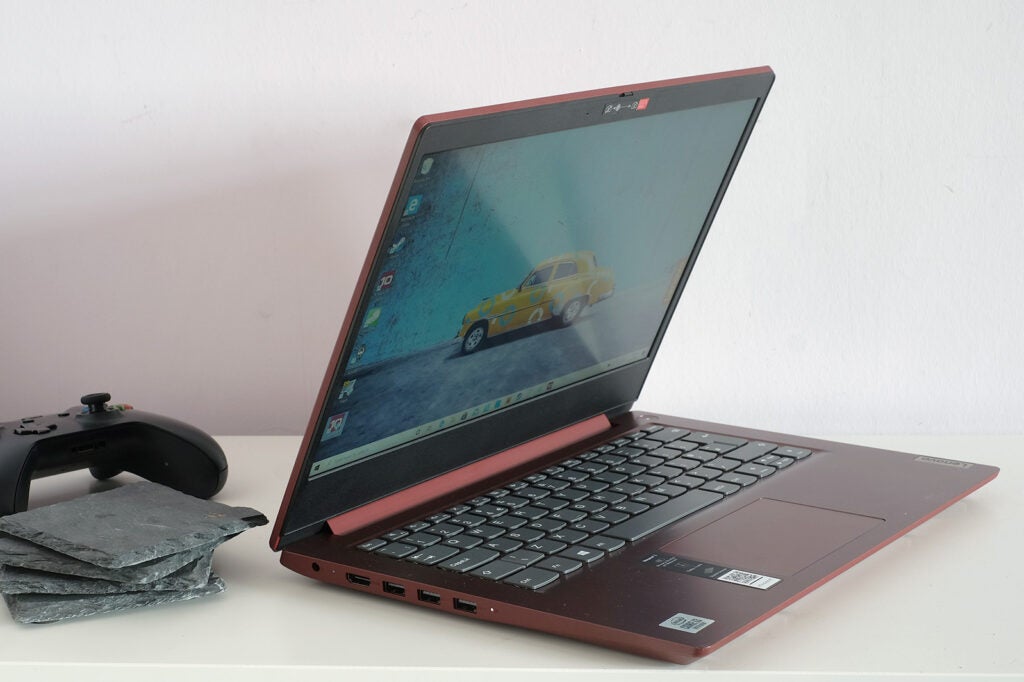
According to PC Mark 10’s battery tests, it lasts for five hours and 28 minutes of basic office productivity work. Using it to write a document outdoors, which all but mandates maximum display brightness, and it lasts around six hours. That may seem impressive until you remember the screen itself is pretty dim.
The Lenovo IdeaPad 3 won’t last through a full day of work but if you just need it to hang on through an afternoon working in a cafe, no problem.
This laptop uses a standard cylindrical plug to charge, which is obvious when you remember there aren’t even any USB-Cs here. A charge takes around two hours, and it goes from flat to 30% in 30 minutes.
Should you buy the Lenovo IdeaPad 3?
I would be happy doing 90% of my work on the Lenovo Ideapad 3 were it not for one thing: the low-quality screen.
Its TN panel lets down what is otherwise a very capable laptop, one with a solid processor among budget models and a nice deep-action keyboard. The faux-metallic panels will likely trick a few people into thinking you spent more too.
Dig deep and do just that and you can get the IdeaPad Flex 5i instead. It has an IPS touchscreen with flexi hinge, which will look much better. Or if you only need a laptop for basic work and entertainment, don’t forget a Chromebook. You can spend less on one of those and get a better display than the Lenovo IdeaPad 3’s.
How we test laptops
Unlike other sites, we test every laptop we review thoroughly over an extended period of time. We use industry standard tests to compare features properly. We’ll always tell you what we find. We never, ever, accept money to review a product.


